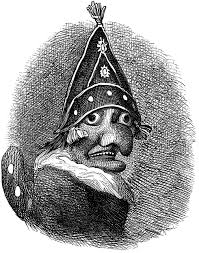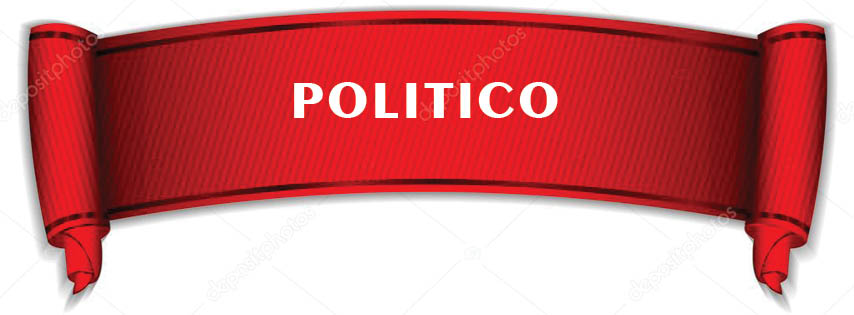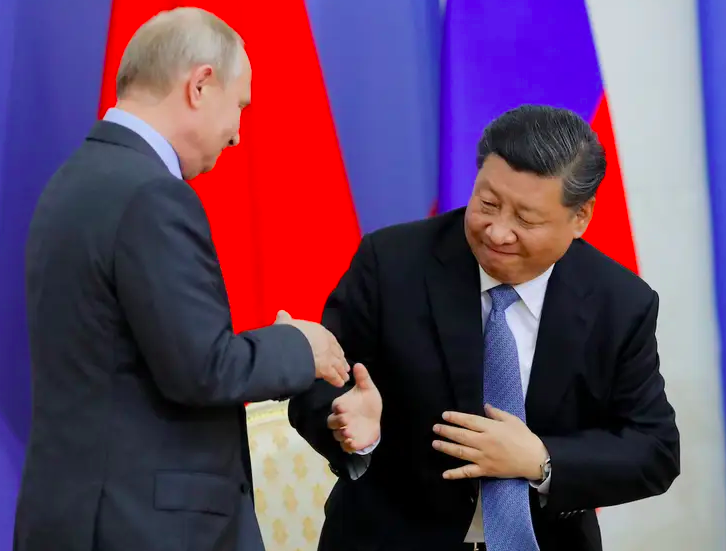Sunday Morning / September 18, 2022
Chinese President Xi Jinping and Russian President Vladimir Putin met during a summit in Uzbekistan this week. It’s the first in-person meeting for the two leaders since the Olympic Games in Beijing; where in a 5,300-word statement they declared their mutual friendship had “no limits.”
The Shanghai Cooperation Organization (SCO) summit in Uzbekistan comes just weeks ahead of Xi assuming a third term in power; cementing his role as China’s most powerful leader since Mao Zedong.
It also coincides with Russia’s invasion of Ukraine; where tens of thousands of civilians have died; and approximately 8 million refugees have been displaced or fled to Europe. Heavily sanctioned by the West, Russia has failed to achieve their military goal of ‘liberating Ukraine’s entire eastern Donbas region’ after seven months and Putin offered insight on Friday. “We’re not in a rush. We have so far responded with restraint — but just yet.”
That Xi began his trip in Kazakhstan — a former Soviet Republic where China has invested $14 billion into oil and gas — confirms not only that China has no limits; but that it’s committed to embedding itself into the infrastructure of Central Asia; and casting itself as a challenger in the present-day unipolar world of international power.
SCO Summit
The Shanghai Cooperation Organization (SCO) is a mutual political, economic and security agreement between China, Kazakhstan, Uzbekistan, Kyrgyzstan, Russia, and Tajikistan. The SCO entered into force in 2002 and has since picked up India, Pakistan and soon Iran to expand into a 9-member alliance in the East.
Observers, dialogue partners and guest attendees equate to 22 of the world's largest nations and organization; covering approximately 60% of Eurasia, overseeing 40% of the world population, and influencing more than 30% of global GDP. However, the Council of Heads of State — the decision-making body at the SCO — all kiss the hand of China.
Designed as a treaty to promote military trust in boarder regions, the Shanghai Five was conceived by Russian President Boris Yeltsin and Chinese leader Jiang Zemin in 1997 to address a “multipolar world.” Initially, the SCO was primarily centered with security-related concerns; often describing the main threats it confronts as “terrorism, separatism and extremism.”
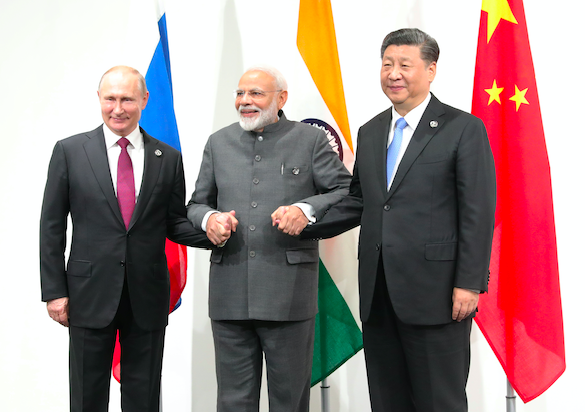
Putin, Modi, Xi at SCO in 2022
It developed quickly into military activity (strategic bombers resumed regular long-range patrols for the first time since the Cold War) and economic cooperation (the long-term objective of the SCO is to establish free trade between its members), with the very latest update coming in June 2022 when Iran's Deputy Foreign Minister Mehdi Safari suggested creating a single SCO currency to facilitate trade and financial transactions among SCO members.
The SCO is considering a new single currency for carrying out trade among the members of the Eurasian bloc including China, India and Russia — three of the largest emerging economies of the world — to counter the U.S. dollar-dominated global financial system.
Belt and Road Initiative
It was the superhighway of the ancient world. From Peking to Constantinople, the Silk Road was the central artery of economic, political, cultural and religious interactions between the East and West, and the conduit for a single currency called gold. Today, it’s the centerpiece of Xi Jinping’s global infrastructure called the Belt and Road Initiative.
China’s “Major Country Diplomacy” calls for China to assume a leadership role for global affairs in accordance with its rising power and status. In 2009, China gave $10 billion to SCO members to stabilize their economies during the global financial crisis. By 2022, 149 countries had partnered with the SCO to create infrastructure in Central Asia that partners with and supports China's economy.
Polarity, in international relations, refers to the distribution of global power by one of three entities: unipolarity, bipolarity, and multipolarity.
“The Shanghai Five was an attempt to counterbalance the activities of the United States and NATO following WWII,” according to former U.S. National Security Advisor, Zbigniew Brzezinski, who observed in 1977 “the United States and NATO allies achieved a state of unipolarity over the entire world.”
“Control of Central Asia is critical to global domination,” Russian Foreign Minister Sergey Lavrov says, "and the Shanghai Cooperation Organization provides the new model of geopolitical integration."
But it was the Greeks who first appeared in the East; with the Macedonian empire of Alexander the Great expanding into Central Asia in 329 BC; expeditions presaged and made possible by inroads, trading partners, and military outposts resulting from the Peloponnesian War.
Dictators Without Borders
Observing Sparta’s growing fears of Athens’ rising power, Thucydides, a military general and historian, predicted the Peloponnesian War. It drew on and on for 27 years because two regional powers competed to control the Greek world.
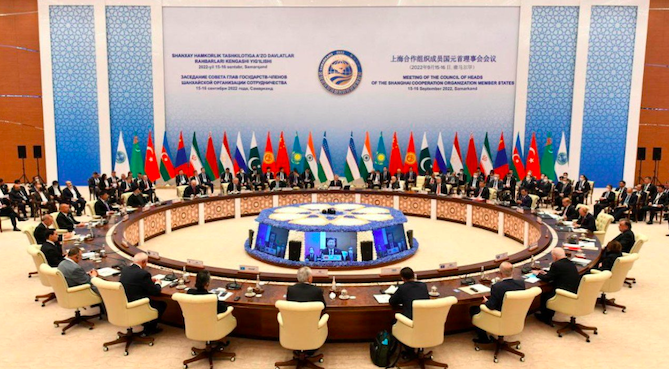
SCO Conference 2022
But are the conflicts between city-states in a backwater Eurasian promontory 2,500 years ago a reliable guide to modern geopolitics? Controlling the South China Sea, Taiwan, and Central Asia will ensure a bipolar power distribution in the world. Xi Jinping offers closing remarks to the SCO on Friday;
“In the face of the colossal changes of our time on a global scale, unprecedented in recent history, we are ready to team up with our Russian colleagues to set an example of a responsible world power, and to play a leading role in putting a rapidly changing world on the track of sustainable and positive development."
Harvard University’s Graham Allison coined the term “Thucydides Trap” observing, "China-U.S. relations are currently on a collision course for war.” Xi acknowledged this tension in 2020, and in July warned U.S. President Biden, "those who play with fire will perish by it."
But it was the American mathematician Frank Harary who famously predicted coalition formations in international relations. Considered the Father of the Graph Theory, Harary used an Indian proverb “the enemy of my enemy is my friend” to explain his Balance Theory: a pair of friends with a common enemy create a balanced triangle. Laying inroads into Central Asia General Thucydides writes, “The growth of the power in Athens, and the fear this inspired in Sparta, made war inevitable."
Penning the Republic nearly 25 years on, Plato responds to the logic. “But I'm neither Athenian nor Greek... just a citizen of the world.”




